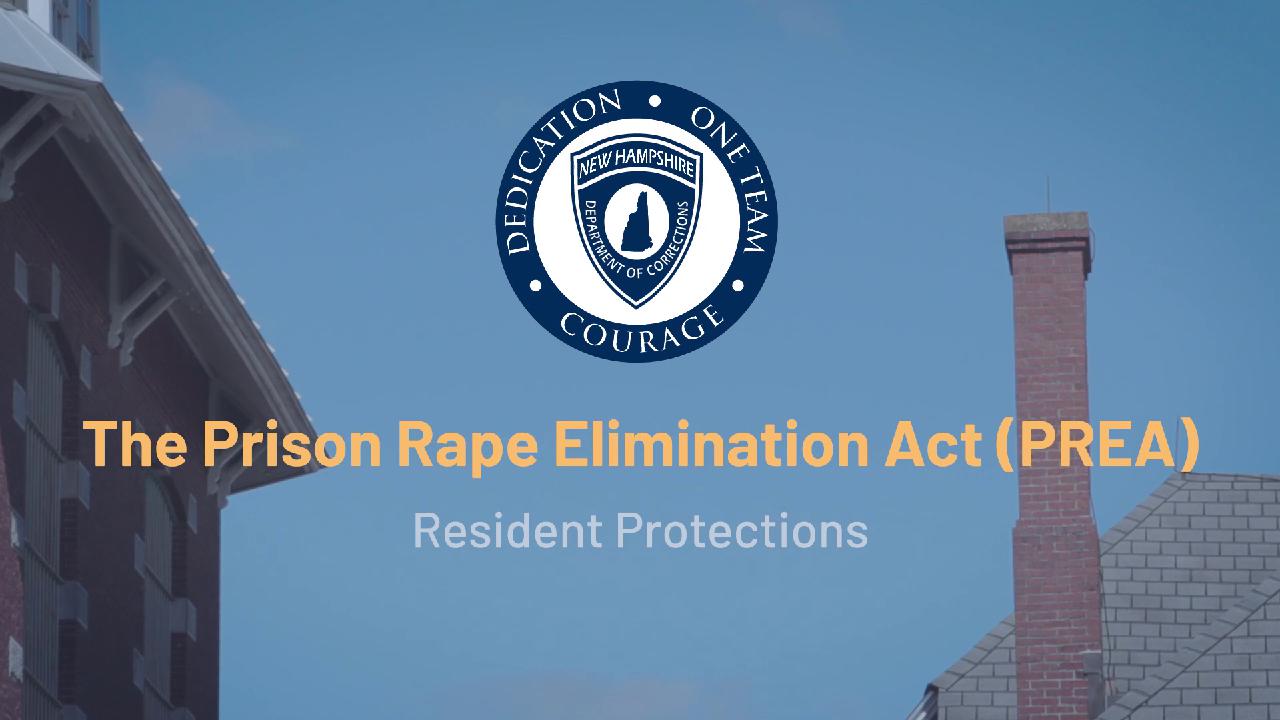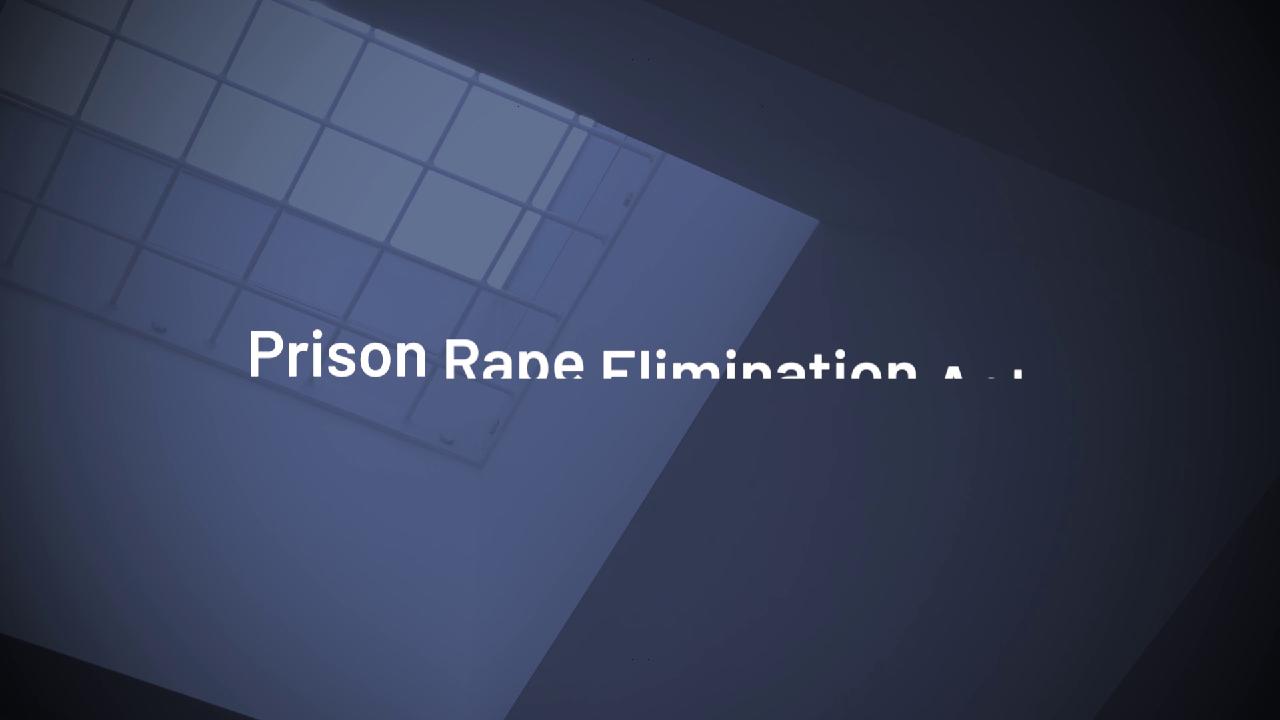PREA Public English
Transcript of video:
Hi, my name is Jonathan Boisselle.
I have been employed by the New Hampshire Department of Corrections for more than 14 years. I started at the New Hampshire Department of Corrections as a Corrections Officer Trainee, then became an Interior Officer at the Men's Prison, worked as a Field Training Officer, and joined the SERT team. I've worked in SPU and RTU and was a Corporal at the Men's Prison before becoming a Chief Probation and Parole Officer. I believe in the New Hampshire Department of Corrections and its mission. I am here today to talk to you about the Prison Rape Elimination Act. The Prison Rape Elimination Act, also known as PREA, was signed into law in 2003 with the goal of eradicating prisoner rape in correctional facilities. It is the policy of the New Hampshire Department of Corrections to protect individuals under our supervision from all forms of sexual abuse and sexual harassment. Under our zero tolerance policy, we will investigate all allegations of sexual abuse and sexual harassment, whether reported by staff, resident, family member, chaplain, contractor, volunteer, member of the police, or any other source. If your loved one or someone you know discloses to you that they have been sexually abused or sexually harassed while incarcerated, please report this information right away by calling 1-888-646-6842, visiting the New Hampshire Department of Corrections Victim Services website, or by emailing us at PREAreporting@doc.nh.gov. Every new resident entering a New Hampshire Department of Corrections facility will receive an Initial Intake Screening that includes a PREA Risk Assessment. Questions on the PREA Risk Assessment can be personal in nature and are not meant to be invasive; rather, they are asked to assess the resident’s safety, and help to determine appropriate housing and other programs deemed necessary by the Court or the New Hampshire Department of Corrections. Though these questions may feel uncomfortable, they must be answered. Here is a quick look at the PREA Risk Assessment in action.
In your past, have you been sexually abused, sexually assaulted, or sexually victimized?
No.
Are you concerned about your ability to defend yourself while incarcerated?
No.
Do you identify as gay, lesbian, bisexual, intersexual, transgender, and/or have you been diagnosed with gender dysphoria?
No.
Regardless of gender, gender identity, age, race, or behavioral health, all residents are at risk of potentially becoming a victim of sexual abuse or sexual harassment. We take each report of sexual abuse or sexual harassment seriously. There are multiple ways for a resident to report sexual abuse or sexual harassment. This includes speaking directly with a staff member or officer, completing a request slip, writing a letter, or by making a disclosure during a mental health or medical appointment. Incidents may be reported by a third party such as a family member or friend or can be submitted via phone or electronic mail to the PREA contact information listed on the Victim Services website. The Investigations Bureau is responsible for a timely and thorough investigation of all reported incidents of sexual abuse and sexual harassment. The PREA Advocate will work alongside the investigator throughout the interview process. Together, they will ensure that the resident is treated with fairness, compassion, and respect throughout the investigation.
The PREA Advocate will further meet with the victim for support and retaliation checks and to confirm if additional safety measures or health treatment is required. The victim will be offered the opportunity to speak with an outside advocate on any subject matter related to the report. At the conclusion of the investigation, residents will be notified of the outcome. The three possible outcomes are as follows: The report is unfounded. The allegation was investigated and determined not to have occurred. The report is unsubstantiated. There is not enough supporting evidence to prove or disprove the reported incident occurred. The report is founded. Evidence supports that the incident reported did occur.
A determination is made as to whether the case will be forwarded to the County Attorney's Office for possible prosecution. Additionally, a decision is made to hold the perpetrator accountable administratively by a disciplinary report. If the allegation is prosecuted by the state, the perpetrator could receive a felony level conviction and may potentially face prison time. The PREA Advocate will meet with the victim to discuss the final outcome, provide provide resources, and discuss next steps.
Thank you for watching our video about this very important topic. Sexual misconduct in all its forms goes against our values and our mission at the New Hampshire Department of Corrections. Our agency has a zero tolerance policy against sexual misconduct and investigates all allegations. 45% of our residents have self-reported a history of trauma. Accordingly, the department established practices and training to ensure that victims of sexual misconduct are not re-traumatized. We have team members that are trained to understand the relationship between trauma and changes in behavior, and some staff work in collaboration with Survivors Support System and other Human Services agencies
to help facilitate the long term support that may be needed. Being trauma informed, we strengthen our investigative outcomes, increase safety and accountability, and reduce the impact of trauma on survivors. Our goal is always to have zero incidents of sexual misconduct. All staff members, contractors and volunteers are educated and PREA so they can respond to potential occurrences in an informed thoughtful, safe, and proactive manner. The Department has an obligation to educate all staff, contractors and volunteers in PREA and all staff contractors and volunteers have a duty to report any known or suspected incidents of sexual misconduct in our facilities. Residents can report incidents directly to staff in writing anonymously or to a third party such as a teacher, case manager, medical provider, or a loved one. Family and the general public can report incidents by calling 1-888-646-6842 or by emailing PREAreporting@doc.nh.gov. That's PREAreporting@doc.nh.gov. When staff are aware of any information related to a possible PREA reportable incident, they have an obligation to immediately report it. Remember, all staff, volunteers and contractors have a duty to immediately report any information regarding sexual misconduct known to them. Thank you for your time. And remember, you are part of the solution.






